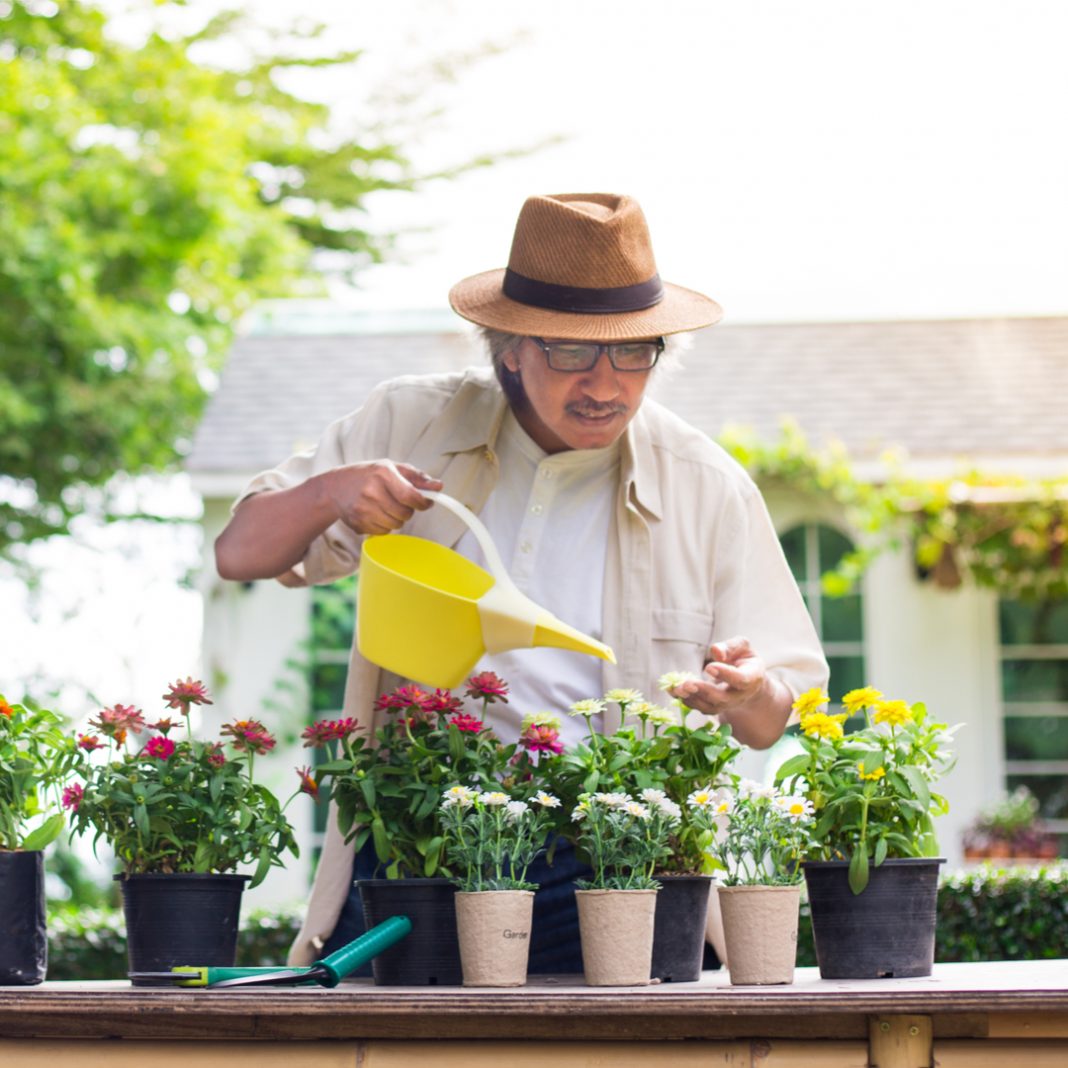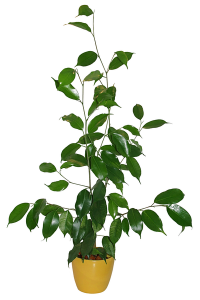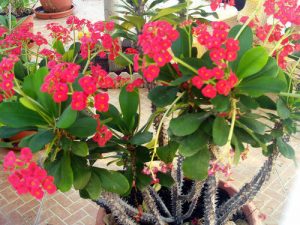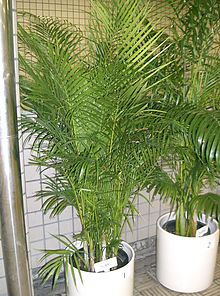Gardening will help you maintain a better mind and body. The benefits are too many to overlook
If senior citizens had to choose a pastime that is relaxing, enjoyable, fulfilling, and a source of great happiness, home gardening will definitely feature among the top. The joy of seeing roses bloom, succulents shine or periwinkle flower all year round, is hard to match. Whether you have a few indoor pots, window sill plants, hanging space greens or a sunny balcony that you can strew with blooms, you can start gardening and build your own special green space and fill it with native flowers and plants. Worldwide, gardening is being promoted as a therapeutic hobby, especially for the elderly. It provides gentle physical activity and has a tremendous positive impact on mental health.
The healing power of gardening has been long established. It eases a restless and anxious mind. Imagine sowing the seeds, watching the sapling sprout, flowers or fruit appearing, the delight is absolutely supreme. An easy and wonderful way to reduce stress and restore peace of mind, gardening even for ten minutes daily has tremendous benefits for seniors.
Some great benefits of keeping your roses in bloom include:
Keeps you fit
Gardening involves plenty of physical exercise and is a great way for seniors to keep fit. Activities like weeding, digging, shovelling, shifting pots, bending, stretching are super ways to get the needed exercise.
You may not be aware, but you are getting the benefits of regular physical activity. It strengthens muscles and bones, prevents osteoporosis, aids weight loss, reduces risk of heart diseases, diabetes, and arthritis, and lowers blood pressure. In short, it provides a ticket to your physical fitness and well-being.
Builds your immune system
Wonder how gardening affects the immune system? According to research, there are beneficial bacteria present in the soil that can improve your immune system. It helps you fight infections and helps you get sick less. It defends against allergies, asthma, eczema, which can arise due to weakened immune systems.
Keeps you mentally happy
You’ll be surprised at how growing a garden keeps your mind happy and robust. While it is not too difficult to oversee and cultivate a garden, there could be challenges that you may have to confront. Leaves, flowers, and buds drop off, plants stop growing, stems turn woody. But you have to battle on and nurse your plants back to health.
Eventually when your effort bears results and the plant becomes sturdy, you get a happy boost. You learn to overcome little obstacles in life. You become stronger and happier in your mind. The reward of gardening activities releases the feel-good hormone, dopamine.
Reduces cognitive decline
Gardening is related to better brain function. You are required to concentrate and remember your plants. You need to be attentive about caring for your plants, the right amount of water, sunshine, fertiliser and manure needed for each. You have to keep in mind how each plant reacts to changing seasons, be heedful about adequate light and shade.
Looking after your plants keeps you alert and mindful. Some studies have found that it can even reduce risk of Alzheimer’s disease and dementia.
Better sleep is your reward
The physical activity of gardening tires you out in a good way. The arm, leg and chest muscles work in coordination. It encourages mobility and flexibility. Snipping flowers, digging, raking can take away a lot of energy and wear you out enough to ensure a good night’s rest.
The exercise (in the garden), helps release the serotonin hormone – the happy hormone – which reduces stress and anxiety levels and helps in sleeping, eating and digestion. Gardening can be a great way to achieve total body workout that is easy and moderate.
Get your precious dose of Vitamin D
Stepping out into your little garden patch, can help you absorb vitamin D through exposure to sunlight. Spending time in the sun while gardening can help boost levels of vitamin D. Vitamin D helps build stronger bones. It helps regulate mood and reduce depression.
A vitamin deficiency could lead to tiredness, aches and pains. Even brief exposure to the sun usually allows you to produce a substantial amount of vitamin D. keeping plants in bright rooms and sunny windows will definitely help.
Reduces your risk of heart disease
The Vitamin D that seniors take in while gardening whether at home or outdoors also reduces the risk of heart disease. Being on your feet and active, keeps you away from an all-day sedentary routine. Long periods of sitting, increases the risk of cardiovascular diseases, strokes, and diabetes. Moving and light motor exercises involved in gardening helps better circulation and improved blood flow. There is also increased oxygen delivery. It is one of the best ways you can keep your heart in a fine fettle.
Here are some plants that are easy to grow at home: (Note: As there are many varieties of each plant; you can choose what you like best)
 Ferns or pteridophyte (Tracheophyta)
Ferns or pteridophyte (Tracheophyta)
The lemon button fern or Boston fern or Bird’s nest especially, are easy care ferns, decorative and among the best beginner plants. This evergreen plant not only helps to rid the home of harmful toxins it improves humidity by helping to restore moisture to the air naturally too. Because of these air-purifying properties, the Boston Fern in particular, is said to offer real health benefits to those who suffer from dry skin or irritably dry noses or throats.
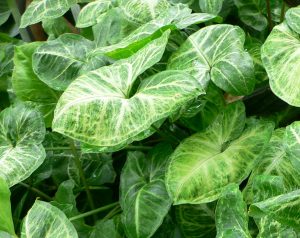 Syngonium (Syngonium podophyllum)
Syngonium (Syngonium podophyllum)
A popular houseplant, the air purifying Syngonium plant is hardy and does not require too much water. Commonly known as arrowhead, the distinct foliage of Syngonium varies from arrow shape to five-lobed pattern with age, which portrays the five elements of Feng Shui–Earth, Metal, Water, Fire, and Wood, creating an ideal balance of Yin Yang. It promotes positivity, “chi or energy,” and also cleans the air of all toxins. Syngonium will also help in lowering down stress and anxiety, according to Feng Shui.
The Weeping fig or Ficus Tree is a common indoor house plant. A ficus in your living room can help filter out pollutants that typically accompany carpeting and furniture. Once you get the exact air, light and water it needs, a ficus is your true home buddy. It provides that touch of elegance to your interiors, and can even double up as a decorative tree!
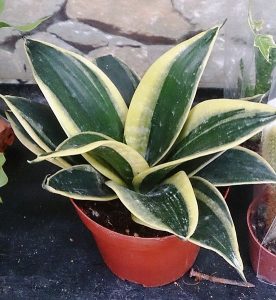 Snake Plant (Sansevieria trifasciata ‘Jade Dwarf Marginated’)
Snake Plant (Sansevieria trifasciata ‘Jade Dwarf Marginated’)
There are loads of varieties of the Snake Plant, also known as mother in law’s tongue. All are easy to grow and a welcome addition to any home or garden. This plant grows well even in low light. Whichever variety you pick, they are all great air purifiers.
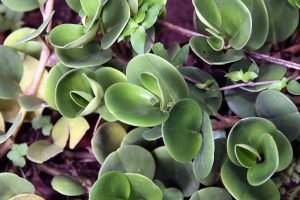 Baby Rubber Plant (Peperomia Obtusifolia)
Baby Rubber Plant (Peperomia Obtusifolia)
This can be a great addition to your garden or inside your home. It’s easy to maintain and has wonderful anti-pollution benefits.
The beauty queen of every garden, there are more than 300 species of roses that you can enjoy. Rose care is easier than you think—anyone can grow them successfully.
Plant your roses in a sunny location with good drainage. Pick one that warms your heart and remember to fertilise them regularly for impressive flowers.
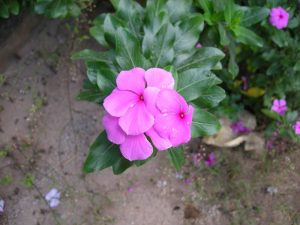 Periwinkle Catharanthus roseus
Periwinkle Catharanthus roseus
Periwinkle is a happy-go-lucky small subshrub. In Hindi we call it Sadabahar because it grows in adverse conditions, rain, heat, dust. It can be quite often seen growing out of cervices of walls. The blue and violet flowers grow throughout the year, and are a pleasure to watch.
To grow a sadabahar plant at home, you can either grow it from seeds or cuttings. Use a well draining potting soil and provide it with a lot of direct sun, watering it sparingly when the soil dries out.
Euphorbia milii, the crown of thorns, Christ plant, or Christ thorn, flower dependably when they get enough light. They’re easy to grow and drought-tolerant, preferring slightly dry, sandy soil.
This succulent stores water in its thick stems just like a cactus, so you can water it less frequently than other house plants. Once they flower, the bright red hues are a pure delight.
Dypsis lutescens, also known as golden cane palm, areca palm, yellow palm,, butterfly palm, or bamboo palm, is a species of flowering plant in the family Arecaceae, native to Madagascar and naturalised in the Andaman Islands.
Areca palms are hands down the most popular palms, and another fantastic oxygenating plant. These plants love the outdoors, they like bright, filtered sunlight, but they also can tolerate full sun. Ideally, they should have protection from the strong afternoon sun, as too severe of light can scorch the foliage. Indoors, areca palms do best with bright light exposure from a south- or west-facing window.
That’s a wrap of a few of everyone’s favourite plants. There are millions to choose from so go ahead and experiment with plants that you connect with, the ones that grab your attention.
We will follow up with an article on what NOT to do with your plants. For instance, it is detrimental to move potted plants around — whether outdoor to indoors, vice versa, or around your outside space. This is because you risk the plants not getting sufficient light, water, and heat that they have become accustomed to. There is a risk of damaging the plant when moving it. You need to be careful to pick the right location when moving the potted plants.
Looking at all the benefits of developing green fingers, if you aren’t gardening yet, you must begin right away.
Developing your own green space requires little investment, but the benefits are too many to overlook. Start with a single pot, and build on the magic that plants bring into your world.


